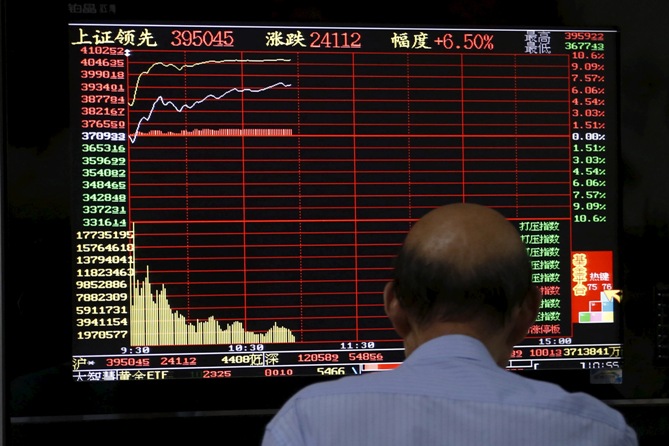Beijing has stemmed the market's freefall through a rash of measures

China's four-week-long stock market rout has wiped 28 per cent off the Shanghai Composite Index and also inflicted pain on Asian firms most exposed to its mammoth economy.
Korean exporters, Australian miners and Japanese tourism companies and exporters have tumbled much more than their respective markets.
Foreigners own only a tiny fraction of Chinese equities but regional companies that depend on Chinese demand, or are proxies for China risk, are vulnerable to selling.
The regional fallout could continue, particularly if bans on sales imposed by Chinese regulators to stem the losses remain in place, or the relisting of suspended stocks leads to further falls in Chinese shares.
"If people can't sell in China, the risk is of course that they go elsewhere," said Herald Van Der Linde, head of Asian equity strategy at HSBC.
"The anticipation is that they will sell in Hong Kong, in countries where they have large positions, and in markets that have direct exposure to China."
Bernard Aw, market strategist at IG in Singapore, noted that Australian mining stocks and the broader Hong Kong market were especially vulnerable.
By midday on Friday, Hong Kong's Hang Seng, a fifth of which is mainland companies, had plunged 9 percent since the Chinese meltdown began on June 12, while the market in Taiwan, China's biggest trading partner, had lost 5.9 per cent.
In South Korea, companies that export to China were especially hard hit with LG Electronics and semiconductor manufacturer SK Hynix both sliding 13 per cent since the Chinese crash began on June 12, compared with a 2 per cent decline in the benchmark KOSPI.
REGIONAL REVERBERATION
In Australia, which sells much of what it mines to China, Fortescue Metals has slumped 26 per cent, Rio Tinto 9 per cent and BHP Billiton 5 per cent, versus a retreat of just 0.7 per cent in Australia's S&P/ASX 200.
The yen's traditional status as a safe-haven currency during times of uncertainty has also had a knock-on effect on Japanese companies.
The currency has gained 3 per cent since it hit a 13-year low in early June.
A strong yen hurts the competitiveness of exporters, and China is a big market for Japanese manufacturers.
More directly, Japanese firms which benefited from record numbers of Chinese tourists are now bracing for the prospect many will now stay away.
"There are growing concerns about whether inbound demand will be affected," said Dairo Murata, an analyst at JP Morgan.
"Shares of big brands that depend on inbound tourism for profits are seeing a relatively large depreciation."
Shares of tourism operators, as well as makers of electronics and cosmetics products, popular with Chinese consumers but costly to purchase in China, have declined.
Oriental Land Co, which operates Tokyo Disneyland, has slipped 6.2 per cent since June 12, compared with a 2.4 per cent drop in the benchmark Nikkei 225.
Shares of Shiseido Co initially rose, but have lost 4.5 per cent since June 24, while Sony Corp has slumped 10 per cent.
SUPPORT CALMS NERVES
Beijing has stemmed the market's freefall through a rash of measures, including an interest rate cut, the suspension of initial public offerings and a ban on sales by investors who hold more than 5 per cent of a company for the next six months.
About half of Chinese companies have also halted trading.
These measures helped Chinese shares bounce sharply from Thursday, reversing an early-week slump that helped to calm nerves.
But analysts and investors remain concerned the sell-off is not over yet, as stocks suspended may come under pressure when trade resumes.
"If we see massive losses, that could hurt consumer confidence and Chinese demand as a whole," said Christopher Moltke-Leth, head of institutional client trading at Saxo Capital Markets.
"If they're not able to stem the current collapse in the market there is a real risk it will spread to the broader economy," Moltke-Leth said, adding it would affect the Asia-Pacific region.
Additional reporting by Joshua Hunt in Tokyo; Editing by Nachum Kaplan, Shri Navaratnam and Jacqueline Wong
Image: An investor looks at a computer screen showing stock information at a brokerage house in Shanghai, China, July 10, 2015. Photograph: Aly Song/Reuters












 © 2025
© 2025